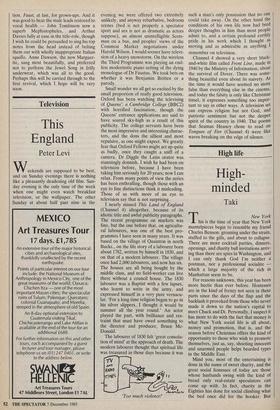Television
This England
Peter Levi
Weekends are supposed to be best, and on Sunday evenings there is nothing like a pleasantly deadening old film. Sun- day evening is the only time of the week when one might even watch breakfast television, or the wallpaper. The other Sunday at about half past nine in the evening we were offered two extremely unlikely, and anyway rebarbative, bedroom scenes (bed is not properly a spectator sport and sex is not as dramatic as actors suppose), an almost unintelligible Scots- man on a bus, and peoples' views of the Common Market negotiations under Harold Wilson. I would sooner have televi- sion of a heavy snowstorm, On the wireless the Third Programme was playing an end- less modernistic piano setting of the dying monologue of Dr Faustus. We took bets on whether it was Benjamin Britten or a parody.
Small wonder we all get so excited by the small proportion of really good television. Oxford has been watching the televising of Queens': a Cambridge College (BBC2) with horrified fascination, though the Queens' entrance applications are said to have soared sky-high as a result of this publicity. The college servants have been the most impressive and interesting charac- ters, and the dons the silliest and most repulsive, as one might expect. We greatly fear that Oxford Fellows might act up quite as badly, once they caught a sniff of a camera. Dr Diggle the Latin orator was stunningly donnish. I wish he had been on television before, because I have been taking him seriously for 20 years; now I can relax. From many points of view the series has been enthralling, though those with an eye to fine distinctions think it misleading. Those of us with more of an eye to television say that is not surprising.
I nearly missed This Land of England (Channel 4) altogether, because of its idiotic title and awful publicity paragraphs. The recent programme on markets was fine, but the one before that, on agricultu- ral labourers, was one of the best pro- grammes I have seen in many years. It was based on the village of Quainton in north Bucks., on the life story of a labourer born about 1782, written by himself in 1830, and on that of a modern labourer. The village once had 2,000 labourers, and now has six. The houses are all being bought by the middle class, and no field-worker can live there without a council house. The 1830 labourer was a Baptist with a few lapses, who learnt to write in the army, and expressed himself in a very pure vernacu- lar. 'For a long time religion began to go in his silver slippers, I thought it would be summer all the year round.' An actor played the part, with brilliance and res- traint that must have owed something to the director and producer, Bruce Mc- Donald.
The labourer of 1830 felt 'great consola- tion of mind' at the approach of death. The modern labourer thought that spiritual life was treasured in those days because it was 'Too much violence!' such a man's only possession that no one could take away. On the other hand the conditions of his own life now had bred deeper thoughts in him than most people admit to, and a certain profound earthly pride in his work which I thought as moving and as admirable as anything I remember on television.
Channel 4 showed a very short black- and-white film called Front Line, made in 1940 by the Ministry of Information, about the survival of Dover. There was some- thing beautiful even about its naivety. At the time it would have seemed no more false than everything else in the cinema, and today the falsity is only like Christmas tinsel, it expresses something too impor- tant to say in other ways. A television set can express religion but not God, and patriotic sentiment but not the deeper spirit of the country in 1940. The poems that Seamus Heaney chose to read on Tongues of Fire (Channel 4) were like waves breaking on the edge of silence.


































































 Previous page
Previous page